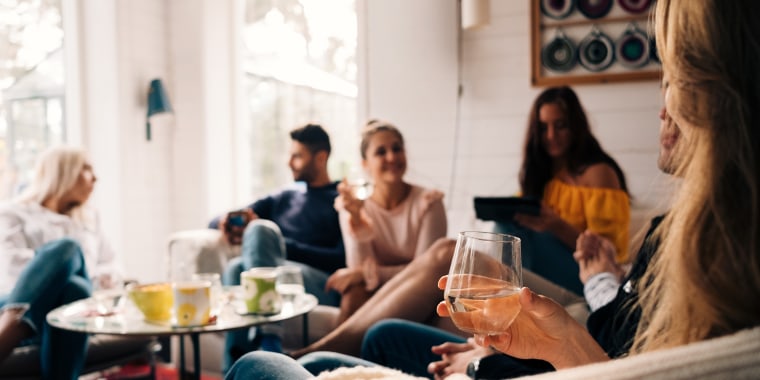If you're quarantining with your family or partner, you might be desperately craving alone time. But if you live on your own and have no human contact, then hunkering down with a few people might sound appealing.
The lack of physical connection that many of us are experiencing right now is the driving reason for the latest trend in the coronavirus outbreak: quaranteaming. Essentially, it means choosing to quarantine with someone you don't live with.
"The Bachelorette" star Hannah Brown popularized the concept when she spent time at the beach home of Tyler Cameron, a contestant on Brown's season of the reality show. Along with a few friends, Brown and Cameron started a TikTok account called The Quarantine Crew to share their antics with fans.
Is "quaranteaming" safe?
While the idea of quaranteaming may sound (and look) like a blast, it can pose a risk to yourself and the general public.
There are "gradations of safety," Dr. Eric Cioe-Pena, an emergency medicine physician at Northwell Health in New York City, told TODAY.
For example, if you've been diligently staying home and so has your chosen quaranteam-mate, then it's not "reckless," he said. "Is it less safe than quarantining alone? From a coronavirus perspective, yes."
As Dr. Richard Martinello, associate professor of infectious diseases at Yale School of Medicine in New Haven, Connecticut, explained to TODAY: "If you're ... quarantining, the more exposures you have is counterproductive ... You're in effect exposing yourself to everyone that additional person was exposed to."
For that reason, you must trust your partner in this endeavor, Dr. William Schaffner, medical director of the National Foundation for Infectious Diseases in Bethesda, Maryland, told TODAY.
"You (need to know) that your partner has indeed been sheltering in place and adhering to all the guidelines," he said, adding that he wouldn't recommend large groups do this and "there is an element of risk."
Mental health benefits of "quaranteaming"
Cioe-Pena also stressed that quaranteaming can improve mental health.
"Everything is a risk benefit," he explained. "It absolutely does have a benefit to staving off the depression ... people can feel when they're socially distancing."
In fact, Cioe-Pena said that quaranteaming can actually help families with older members living alone.
"I've been telling people, 'Pick a relative that's going to live with them,' and that'll be the relative that interacts with them ... and makes sure they're safe, but you need to have a really good plan," he said.
Extra precautions are crucial for those at high risk of developing severe illness from the coronavirus.
What about short-term "quaranteams," like play dates?
Amid stay-at-home orders, many people are still visiting loved ones with the justification that everyone involved has been quarantining.
While it's not ideal to leave your home in pursuit of indoor, social interaction, deliberately minimizing exposure can reduce the risk. For example, if you're considering a play date with another family, leave out the people who've been running errands outside the home, Cioe-Pena advised.
"Risk assessment is based on how much mobility each member of the family has in performing tasks for the family," he said.
For many experts, the bigger concern stemming from quaranteaming is that people are "cutting corners," Schaffner said. "This is not a time to have everybody wear bandanas and throw a party ... There's got to be some judiciousness involved."
Martinello added: "You don't know who else is having social interactions with other people ... It's really contrary to what self-quarantine should be."
How will we know when it's safe to have social interactions again?
Self-quarantine is about slowing spread of the virus long term. For life to return to a degree of normal, viral transmission between people has to be "almost sporadic," and daily infections can't be in "double digits," according to Cioe-Pena.
He added that widespread, fast testing is also necessary — and that's far from where we are.
For now, "the safest thing is to stay in whatever situation you're in," Cioe-Pena said. "But ... whatever we can do to maintain our sanity and protect those at risk, we should do ... This is a marathon, not a sprint."
